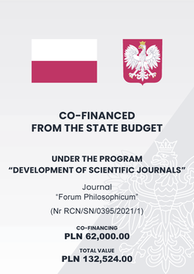- Home »
- Issues »
- 21/2 - Fall 2016 »
- Articles »
Intersections between Paul Ricœur’s Conception of Narrative Identity and Mikhail Bakhtin’s Notion of the Polyphony of Speech
Abstract
Proposing his conception of narrative identity in Oneself as Another, Paul Ricœur holds that human life is comprehensible, once the story of a man’s life has actually been told, and it is the narrative of one’s life which constructs one’s identity. Developing his theory of heteroglossia and the polyphony of human speech, explicated chiefly in Speech Genres and The Dialogic Imagination, Mikhail Bakhtin recognizes the intrinsically intertwining character of utterance and response. According to him, utterance is always addressed to someone and antedates an answer. Bakhtin’s “addressivity,” as well as his view of discourse as fundamentally dialogic, are convergent with Ricœur’s elucidation both of man’s answerability to the Other and of narrative identity. The dynamic character of narrative identity, as construed by Ricœur, converges with the dynamic nature of language as viewed by Bakhtin. The aim of this article is to study the intersections of Ricœur’s narrative theory and Bakhtin’s recognition of the polyphonic nature of speech. I view these as inherently interrelated, and as testifying, respectively, to the philosophical and linguistic aspects of one and the same phenomenological vision. That vision accounts for selfhood, understood as vulnerable and contextualized, while also recognizing that it is conveyed by means of language with its essentially dialogic openness.
Keywords
Cite this article
Hołda, Małgorzata. “Intersections between Paul Ricœur’s Conception of Narrative Identity and Mikhail Bakhtin’s Notion of the Polyphony of Speech.” Forum Philosophicum 21, no. 2 (2016): 227–49. doi:10.35765/forphil.2016.2102.13.
Bibliography
Bakhtin, Mikhail. “From the Prehistory of the Novelistic Discourse.” In Modern Criticism and Theory: A Reader, edited by David Lodge and Nigel Wood, 104–36. London: Longman, 2000. Bakhtin, Mikhail. Problems of Dostoevsky’s Poetics. Edited by Caryl Emerson. Minneapolis, MN: University of Minnesota Press, 1984. Bakhtin, Mikhail. Speech Genres and Other Late Essays. Edited by Caryl Emerson and Michael Holquist. Translated by Vern W. McGee. Austin, TX: University of Texas Press, 1986. Bakhtin, Mikhail. The Dialogic Imagination: Four Essays. Translated by Caryl Emerson and Michael Holquist. Austin: University of Texas Press, 2004. Bernard-Donals, Michael F. Mikhail Bakhtin: Between Phenomenology and Marxism. Cambridge: Cambridge University Press, 1994. Collington, Tara. “Bakhtin’s Chronotope and Metaphoric Models in Hermeneutic Discourse.” In Philosophy, Method, and Cultural Criticism, edited by Charlton McIlwain, 115–36. New York: Hampton Press, 2013. Collington, Tara. “Space, Time and Narrative: Bakhtin and Ricœur.” Space and Culture 4, no. 7–9 (2001): 221–31. doi:10.1177/120633120000300502. Currie, Mark. Metafiction. London; New York: Longman, 1995. Eskin, Michael. Ethics and Dialogue: In the Works of Lévinas, Bakhtin, Mandelʹshtam, and Celan. Oxford: Oxford University Press, 2000. Gardiner, Michael. The Dialogics of Critique: M.M. Bakhtin and the Theory of Ideology. London; New York: Routledge, 1992. Herda, Ellen A. “Narrative Matters among the Mlabri: Interpretive Anthropology in International Development.” In A Passion for the Possible: Thinking with Paul Ricœur, edited by Brian Treanor, and Henry Isaac Venema, 129–46. New York: Fordham University Press, 2010. Holquist, Michael, Dialogism: Bakhtin and His World. London: Routledge, 2003. Holquist, Michael, and Katerina Clark, Mikhail Bakhtin. Cambridge, MA: Harvard University Press, 1984. Hutcheon, Linda. A Poetics of Postmodernism: History, Theory, Fiction. London; New York: Routledge, 2003. Iser, Wolfgang. “The Reading Process: a Phenomenological Approach,” In Modern Criticism and Theory: A Reader, edited by David Lodge, and Nigel Wood, 188–205. London: Longman, 2000. Lévinas, Emmanuel. Totality and Infinity: An Essay on Exteriority. Translated by Alphonso Lingis. Dordrecht; Boston; London: Kluwer Academic Publishers, 1991. Lodge, David and Nigel Wood, eds. Modern Criticism and Theory: A Reader. London: Longman, 2000. McCord, Michael. “Distanciation, Appropriation, and Assimilation as Hermeneutical Making of Meaning in the Work of Paul Ricœur and Mikhail Bakhtin.” Unpublished manuscript, 2000. ERIC digital library (ED438544). Accessed 3 August 2016. https://eric.ed.gov/?id=ED438544. Ricœur, Paul. Fallible Man. Book 1 of Part 2, Finitude and Guilt, of Philosophy of the Will. Trans. Charles Kelbley. Chicago: Henry Regnery, 1965. Ricœur, Paul. “Life: A Story in the Search of a Narrator.” Translated by John N. Kray and A. J. Scholten. In A Ricœur Reader: Reflection and Imagination, edited by Mario J. Valdés, 425–40. Toronto: University of Toronto Press, 1991. Originally published in Philosophical Reflections from Western and Non-Western Perspectives, edited by Marinus C. Doeser and John N. Kraay, (Dordrecht: Martinus Nijhoff, 1986), 121–32. Ricœur, Paul. “Narrative Identity.” Translated by David Wood. In On Paul Ricœur: Narrative and Interpretation, edited by David Wood, 188–99. London; New York: Routledge, 2002. Ricœur, Paul. Oneself as Another. Translated by Kathleen Blamey. Chicago: University of Chicago Press, 1992. Ricœur, Paul. Time and Narrative. Translated by Kathleen Blamey and David Pellauer. 3 volumes. Chicago: University of Chicago Press, 1988. Robinson, Andrew. “Bakhtin: Dialogism, Polyphony and Heteroglossia.” Part I. In Theory (blog). Ceasefire, 29 July 2011. Accessed 1 August 2016. https:// ceasefiremagazine.co.uk/in-theory-bakhtin-1/. Thomson, Clive. Mikhail Bakhtin and the Epistemology of Discourse, vol. 2. Amsterdam: Rodopi, 1990. Treanor, Brian, and Henry Isaac Venema, eds. A Passion for the Possible: Thinking with Paul Ricœur. New York: Fordham University Press, 2010. Treanor, Brian, and Henry Isaac Venema. “Introduction: How Much More Than the Possible?” In A Passion for the Possible: Thinking with Paul Ricœur, edited by Brian Treanor, and Henry Isaac Venema, 1–21. New York: Fordham University Press, 2010. Vanhoozer, Kevin J. “Philosophical Antecedents to Ricœur’s Time And Narrative.” In On Paul Ricœur: Narrative and Interpretation, edited by David Wood, 34–54. London; New York: Routledge, 2002. Venema, Henry Isaac. Identifying Selfhood: Imagination, Narrative, and Hermeneutics in the Thought of Paul Ricoeur. New York: Suny Press, 2002. Wood, David, ed. On Paul Ricœur: Narrative and Interpretation. London; New York: Routledge, 2002.





